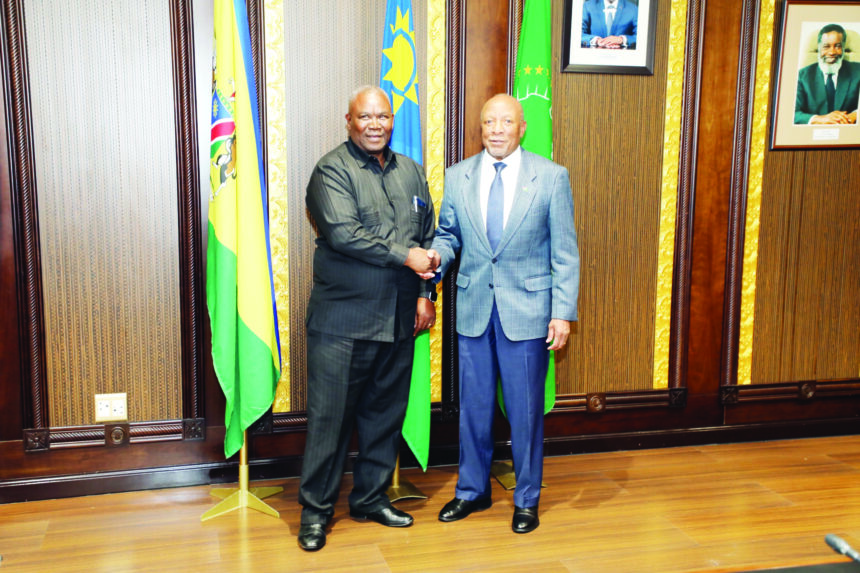The United Democratic Front (UDF) has called on President Nangolo Mbumba to address the delay of the regional council’s budgets, saying it hinders development as capital projects remain at a standstill.
Sesfontein constituency councillor and Kunene Regional Council chairperson Hendrik Gaobaeb, the new UDF president, urged Mbumba to adjust the budget cycle to start earlier to enable regional councils to implement capital projects effectively.
The UDF party paid a courtesy call on President Mbumba yesterday at State House as part of consultative meetings on pertinent national issues.
Gaobaeb, joined by the party’s national leadership, highlighted that the current budget delays significantly impact Namibians’ livelihoods.
“The budget cycle runs from 1 April to 31 March, but Parliament still discusses the budget on 1 April. Why can’t we shift the budget debate to October so that by April it is already signed by the President, and approved and distributed to the regions?” he suggested.
He pointed out that the regional council’s budget is yet to be approved, which is likely only in September, which hampers the progress of capital projects.
“How should the regional council implement capital projects if the budget is approved in September?” he questioned.
He also identified the Procurement Act as another factor delaying capital projects.
The UDF seeks a review of the Act due to its significant implementation delays.
“I don’t know if people lack capacity in this area, but the delay caused by this Act is considerable, and these projects need reviewing to suit the country’s situation,” he explained.
President Mbumba welcomed the budget cycle adjustment proposal, acknowledging its merits but noting the challenges.
“Each finance minister has their strategy. This is a good proposal, but not easy to implement because revenue comes from various sources like agriculture, uranium and other sources. However, we can recommend it to the finance minister for consideration,” he said.
He added that while the budget recommendation can be forwarded, the budget for the financial year 2024/25 has already been signed and approved by the president.
Regarding the Procurement Act, he noted that complaints are common, but the law includes provisions for emergency procurement.
Kunene
According to information provided to New Era during a recent visit to Kunene, the Kunene Regional Council’s budget for the current financial year is yet to be released, according to officials.
The affected local authorities are Opuwo, Outjo, Kamanjab and Khorixas, while constituencies include Epupa, Opuwo Urban, Opuwo Rural, Sesfontein, Kamanjab, Khorixas and Outjo.
The late approval and release of the budget prevents government entities from initiating procurement processes at the start of the financial year, based on the approved budget.
They blame this situation for their snail’s pace of service delivery, New Era has learned.
For the current financial year, the Ministry of Urban and Rural Development received N$1.6 billion, of which N$120 million is earmarked for rural development.
The funds are meant to upgrade and construct sewerage ponds, water infrastructure, electricity supply and road networks in municipalities, towns, villages and settlements.
Return
Last year, Kunene Regional Council said it encountered serious communication challenges with its regional stakeholders.
The key reason was that most capital projects implemented by line ministries are coordinated from their respective head offices in Windhoek.
As a result, the council returned N$56 million to the fiscus.
That year, the region was allocated a total of N$197 million across 16 sectors in the development budget towards the implementation of capital projects for 2022/2023.
By the time of going to print, the Ministry of Urban and Rural Development did not respond to an array of questions sent to them.
Legal conflict
The chairperson of the Kunene Regional Council has urged the president to address Erastus Uutoni’s “lack of cooperation” with the regional council due to an ongoing court case.
“We scheduled an appointment with him to discuss the issue, but he refused, citing it as sub judice. We convened another meeting, but he greeted us, and walked out,” he said.
He noted the wastage of government resources in this matter, as the minister is unwilling to discuss an out-of-court settlement.
“The minister procedurally has approved us to use private lawyers, and he is also using private lawyers, both paid by the government. This is a waste of resources,” he said.
Mbumba promised to summon Uutoni.
“I will contact the minister to discuss what is happening. Walking out of the meeting without a conclusion is not appropriate for a minister. But I will call him, and hear his side,” he assured the team.
Contacted for comment, Uutoni said he would respond to a text message, but did not do so at the time of going to print.
The UDF meeting was part of a series of discussions that Mbumba is holding with political parties and interest groups.
On Tuesday, Mbumba received a courtesy visit from the Popular Democratic Movement (PDM) leadership, led by party president McHenry Venaani.
They too discussed issues of national interest, specifically in the year of elections.
The head of State emphasised the need for constructive engagement on issues of national concern and interest, and to advise one another.
Venaani thanked the President for the invitation, and stressed the need for continuous engagement to solve issues facing the Namibian nation.
(UDF 1, 2 and 3)
Caption:



